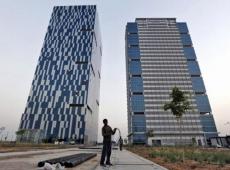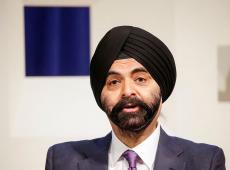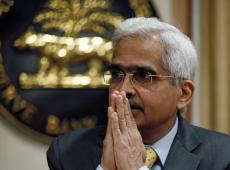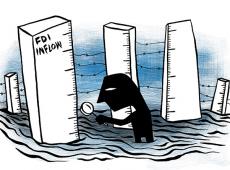Singapore to Stay Open to Foreign Talent Amid Low Birth Rate
By Rediff Money Desk, SINGAPORE Feb 28, 2024 17:56
Singapore's Deputy Prime Minister highlights the need to stay open to foreign talent due to a low birth rate and manpower shortage, emphasizing the importance of attracting skilled workers to fuel economic growth.

Illustration: Dominic Xavier/Rediff.com
Singapore, Feb 28 (PTI) Manpower-short Singapore has to stay open to foreign talent due to slower population growth and resident workforce growth slowing and insufficient to meet the demands of the economy, Deputy Prime Minister Lawrence Wong said on Wednesday.
At the upper end, this means workers can take on jobs in new growth areas such as the digital economy, where there is a global shortage of skilled talent, said Wong.
Speaking in parliament on Wednesday, he said the manpower includes work-permit holders, which comprise about two-thirds of the total foreign workforce, mostly doing jobs that Singaporeans do not want to do.
Prosperous Singapore needs to keep its economy growing so that it can make a living and take care of its people, at a time when the world is becoming more dangerous and unpredictable, he told parliament on Wednesday.
Earlier in the day, Minister in the Prime Minister's Office (PMO) Indranee Rajah told Parliament that Singapore has seen its resident total fertility rate (TFR) drop to an estimated 0.97 per cent in 2023, the first time it has dropped below one per cent in the country's history.
Wong also said Singapore has a comprehensive system of controls to regulate the quality and number of work-pass holders across every level of the workforce.
As he laid out the Government's plans to achieve between 2 and 3 per cent growth annually over the next decade, Wong said, The reality is that Singapore will always be a little red dot (a teaser for being small) we have no hinterland, we have no natural resources, unlike resource-rich countries like Qatar or the UAE.
If we falter, no one will come to our rescue, The Straits Times quoted Wong as saying in parliament.
DPM Wong highlighted that the Government has quadrupled social spending over the last 20 years.
Sustaining growth is therefore the way to help Singaporeans secure a better future, he said, as he detailed how Budget 2024 builds on deliberate moves in recent decades to strengthen social support, which has quadrupled in spending in the last 20 years.
He was speaking at the end of three days of debate in Parliament on his SGD131.4 billion government spending plan that saw 61 MPs from across the aisle airing their views.
In his hour-long, round-up speech, the DPM said increasing value-add is how Singapore can command better prices in world markets, which in turn benefits workers here with higher wages.
Staying attractive to high-quality investments will be essential, as such investments typically involve innovative activities that push the productivity frontier.
The remaining 1 per cent of growth has to come through increases in the workforce, he said.
Following Wong's speech, Leader of the Opposition Pritam Singh said that while growth is important, what is more key is that such growth is sustainable. He cited how the Government had said about a decade ago that the country needed to slow growth down as the situation had changed dramatically.
In response, Wong agreed that growth has to be sustainable. The issue then was about infrastructure, and the Government had since updated its planning processes. For instance, it has ramped up the building of public housing and worker dormitories for foreign workers who are rated as guest workers in Singapore for the construction industry.
At the upper end, this means workers can take on jobs in new growth areas such as the digital economy, where there is a global shortage of skilled talent, said Wong.
Speaking in parliament on Wednesday, he said the manpower includes work-permit holders, which comprise about two-thirds of the total foreign workforce, mostly doing jobs that Singaporeans do not want to do.
Prosperous Singapore needs to keep its economy growing so that it can make a living and take care of its people, at a time when the world is becoming more dangerous and unpredictable, he told parliament on Wednesday.
Earlier in the day, Minister in the Prime Minister's Office (PMO) Indranee Rajah told Parliament that Singapore has seen its resident total fertility rate (TFR) drop to an estimated 0.97 per cent in 2023, the first time it has dropped below one per cent in the country's history.
Wong also said Singapore has a comprehensive system of controls to regulate the quality and number of work-pass holders across every level of the workforce.
As he laid out the Government's plans to achieve between 2 and 3 per cent growth annually over the next decade, Wong said, The reality is that Singapore will always be a little red dot (a teaser for being small) we have no hinterland, we have no natural resources, unlike resource-rich countries like Qatar or the UAE.
If we falter, no one will come to our rescue, The Straits Times quoted Wong as saying in parliament.
DPM Wong highlighted that the Government has quadrupled social spending over the last 20 years.
Sustaining growth is therefore the way to help Singaporeans secure a better future, he said, as he detailed how Budget 2024 builds on deliberate moves in recent decades to strengthen social support, which has quadrupled in spending in the last 20 years.
He was speaking at the end of three days of debate in Parliament on his SGD131.4 billion government spending plan that saw 61 MPs from across the aisle airing their views.
In his hour-long, round-up speech, the DPM said increasing value-add is how Singapore can command better prices in world markets, which in turn benefits workers here with higher wages.
Staying attractive to high-quality investments will be essential, as such investments typically involve innovative activities that push the productivity frontier.
The remaining 1 per cent of growth has to come through increases in the workforce, he said.
Following Wong's speech, Leader of the Opposition Pritam Singh said that while growth is important, what is more key is that such growth is sustainable. He cited how the Government had said about a decade ago that the country needed to slow growth down as the situation had changed dramatically.
In response, Wong agreed that growth has to be sustainable. The issue then was about infrastructure, and the Government had since updated its planning processes. For instance, it has ramped up the building of public housing and worker dormitories for foreign workers who are rated as guest workers in Singapore for the construction industry.
Read More On:
DISCLAIMER - This article is from a syndicated feed. The original source is responsible for accuracy, views & content ownership. Views expressed may not reflect those of rediff.com India Limited.
You May Like To Read
TODAY'S MOST TRADED COMPANIES
- Company Name
- Price
- Volume
- Vodafone Idea L
- 7.47 ( -2.61)
- 31794469
- Srestha Finvest
- 0.69 (+ 1.47)
- 30818849
- Suzlon Energy Ltd.
- 54.71 ( -7.88)
- 24977509
- GTL Infrastructure
- 2.04 ( -3.32)
- 12400595
- AvanceTechnologies
- 0.92 ( -3.16)
- 10155897
MORE NEWS

LTIMindtree Expands US Presence with Houston...
LTIMindtree opens new facility in Houston, focusing on AI, digital transformation, and...

Swiggy CEO: Expecting Solid Growth in Next 3-5...
Swiggy CEO Sriharsha Majety expects strong growth in the next 3-5 years, driven by...

BlueGreen Ventures Launches USD 75 Million Fund...
BlueGreen Ventures, led by Rajeev Suri and Anup Jain, launches a USD 75 million fund...












 © 2024 Rediff.com India Limited. All rights reserved.
© 2024 Rediff.com India Limited. All rights reserved.